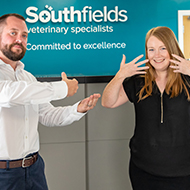
People with hearing issues rely heavily on visual clues and lip reading.
A veterinary referral centre in Essex has introduced a raft of measures to support its deaf clients and tackle the communication difficulties caused by face coverings.
Southfields Veterinary Specialists in Laindon has introduced see-through masks and trained its staff in sign language to ensure that deaf or hard-of-hearing clients do not suffer adversely because of face masks.
It follows calls from deaf charities, including Action on Hearing Loss and the National Deaf Children’s Society, to consider the serious communication issues faced by deaf or hard of hearing people as lockdown eases.
In England, face masks are now mandatory in hospitals, on public transport and, from Friday (24 July), shops, to help prevent the spread of COVID-19.
Hospital director Daniel Hogan, who is driving force behind the initiative, said: “We adapted to the Coronavirus pandemic very quickly and efficiently across the hospital and have been able to offer to support to all of our clients and patients.
"With the easing of restrictions, we are now able to welcome more clients to the hospital, however, it is clear those with hearing issues can be really affected by the use of face coverings, as they rely heavily on visual clues for effective communication.
He continued: “I am actually unilateral deaf myself, so am already a British Sign Language level three signer, and I am providing basic training to members of our team.”
Mr Hogan added that the introduction of transparent face coverings for team members will enable their clients to lip read.
“We’re aware facial expressions and lip-reading are pivotal to the way we communicate, especially in what can be an emotive time for our clients as their beloved pets are given specialist medical treatment,” he said.
“We’ve brought in a range of see-through face coverings, so our clients can not only communicate via signing but also see our team members’ faces clearly as we discuss important elements of their pets’ care and treatment.”
Image (C) Southfields Veterinary Referrals.



 The latest
The latest